Art for the millions :
Fathy Mahmoud’s Legacy
Public Art and the Birth of Modern Egyptian Sculpture
Even a thousand years wouldn’t have been enough for Egyptian artist Fathy Mahmoud to fulfil all his dreams.
From humble beginnings in early 20th-century Cairo, he rose to the pinnacle of artistic achievement in Egypt, creating many of the country’s most famous and beloved works of public art before turning his attention to porcelain production.
Born in 1918, Mahmoud showed exceptional talent from an early age. After his father died when he was still a young boy, Mahmoud – poor and unable to afford art supplies – took to chiseling beautiful reliefs on the walls and staircases of the building where his family lived.
During that time, Egypt was shaking off decades of British rule and European dominance of the arts and beginning to nurture the talents of its own people. Egypt’s School of Fine Arts was founded in 1908, producing graduates who included Mahmoud Mokhtar, the father of modern Egyptian sculpture. Also among them was Fathy Mahmoud, already a prodigy at 19 and the winner of the Mokhtar Award for Egypt’s most beautiful sculpture two years in a row.
Graduating from the Faculty of Applied Arts at Cairo University in 1938, he traveled to Belgium, Italy and France for further studies before returning to Egypt and dedicating himself to beautifying his own country. He specialized in statues on a grand scale, bronzing them in his own studio and foundry rather than sending works to Europe for finishing as was common at the time.
It wasn’t just sculptures. Mahmoud’s bas-reliefs adorned some of the capital’s prime buildings and sites, from the Chamber of Commerce and Press Syndicate, to Cairo University and the Zamalek Tower. He also created nine statues that lined the road from central Cairo to the Pyramids of Giza, one of the seven wonders of the world. Mahmoud saw how artwork in European cities was a draw for tourists and sought the same for Egypt.
“I have visited many countries in Europe and I noticed the people there are able to attract tourists with very simple steps,” he said in a 1952 interview. “They would use a simple rock in an abandoned place or a spooky cave and create a romantic ambiance and in that way they would turn it into a unique touristic place.”
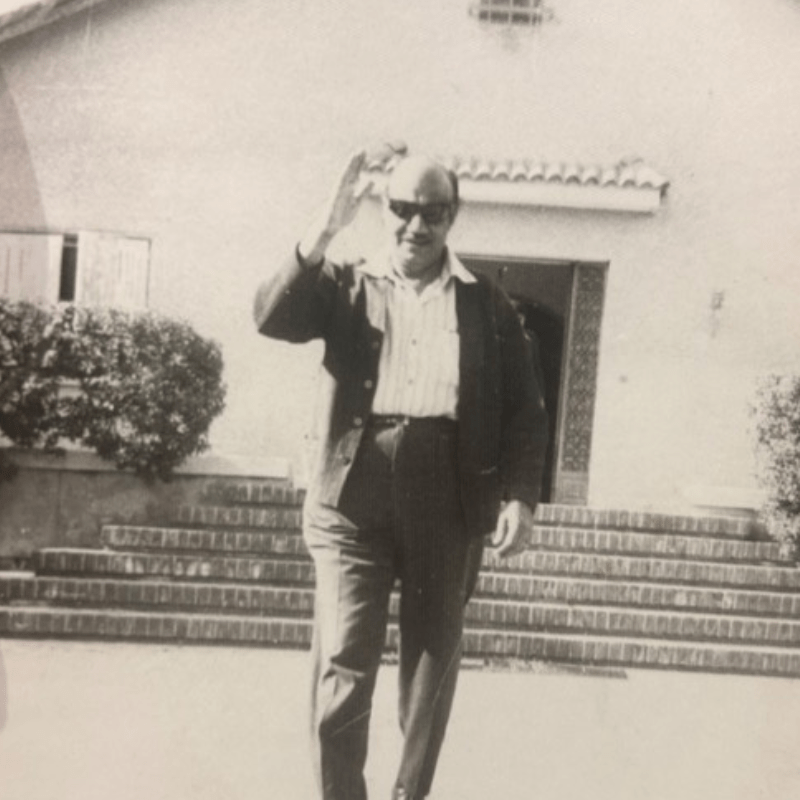
Fathy Mahmoud from his home
A man of art – and a man of industry
Fathy Mahmoud didn’t stop dreaming after his initial successes. Next, he sought to combine artistry with industry and bring his creations into Egyptian homes – an aspiration he achieved in 1952 when he founded the country’s first ceramics factory and began producing intricate vases, figurines and ornaments.
“One of the goals of this talented artist was to create national awareness,” wrote Abdel Ghany El Haras in a biography of Mahmoud. “His factory made us feel our artistic and industrial identity and that we no longer needed foreign products.”
The affordable and well-crafted items “elevated every place with their refined taste and ingenuity, and were available to everyone,” El Haras wrote.
A Legacy of Art for the Millions
In his lifetime, Mahmoud won a total of 22 awards in Egypt and abroad, including the silver medal at the 1958 Brussels World’s Fair for crafting the biggest sculptural panel from ceramic materials. To this day, his works in Alexandria and Cairo are part of those cities’ fabric – places where Egyptians congregate, pose for photographs and celebrate events like engagements and weddings.
This ongoing bond between the artist and the people bears out one of Mahmoud’s ambitious mottos: “Art for the millions – from them and for them.”
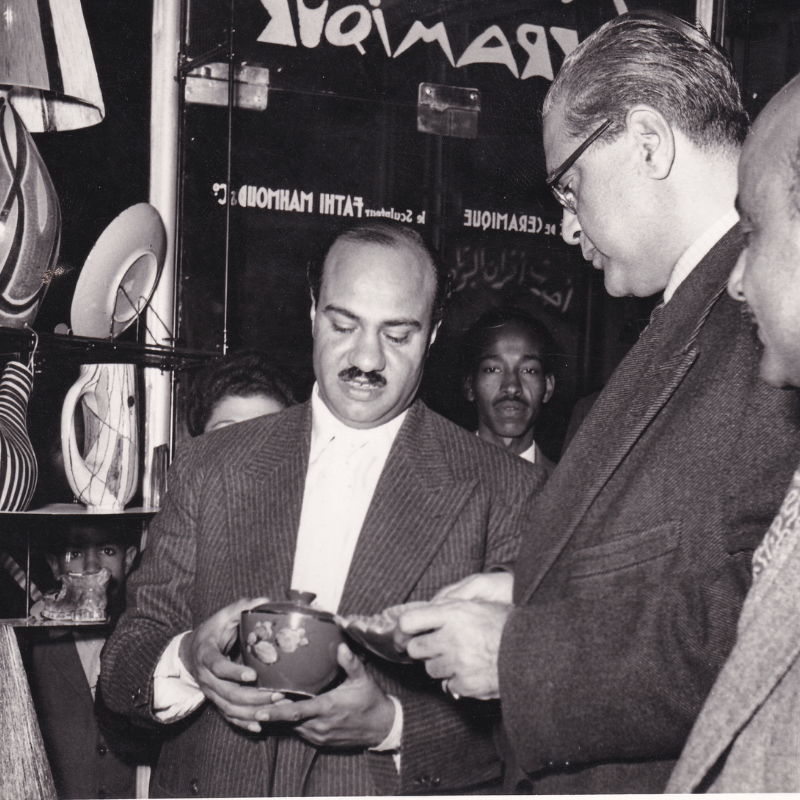
Fathy Mahmoud with the Minister
TimeLine
1920 — Born in Egypt
1945 — Graduated from Cairo University, Faculty of Fine Arts
1952 — Established ceramic workshops and production facilities
1958 — Received international recognition, including awards in Brussels
1960–1975 — Produced major sculptural works and participated in international exhibitions
1980 — Legacy consolidated through continued production, teaching, and institutional influence
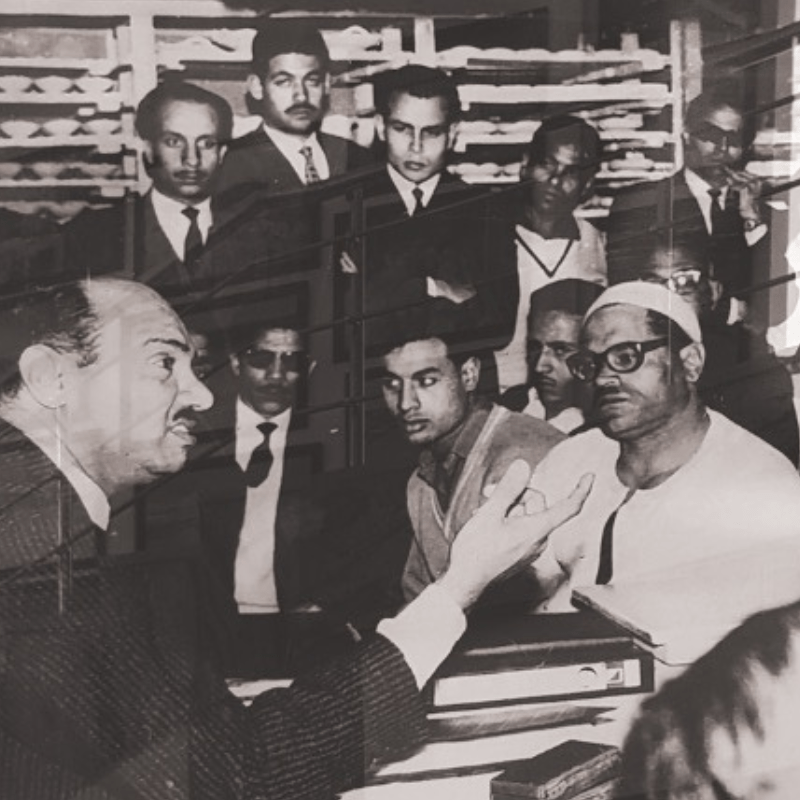
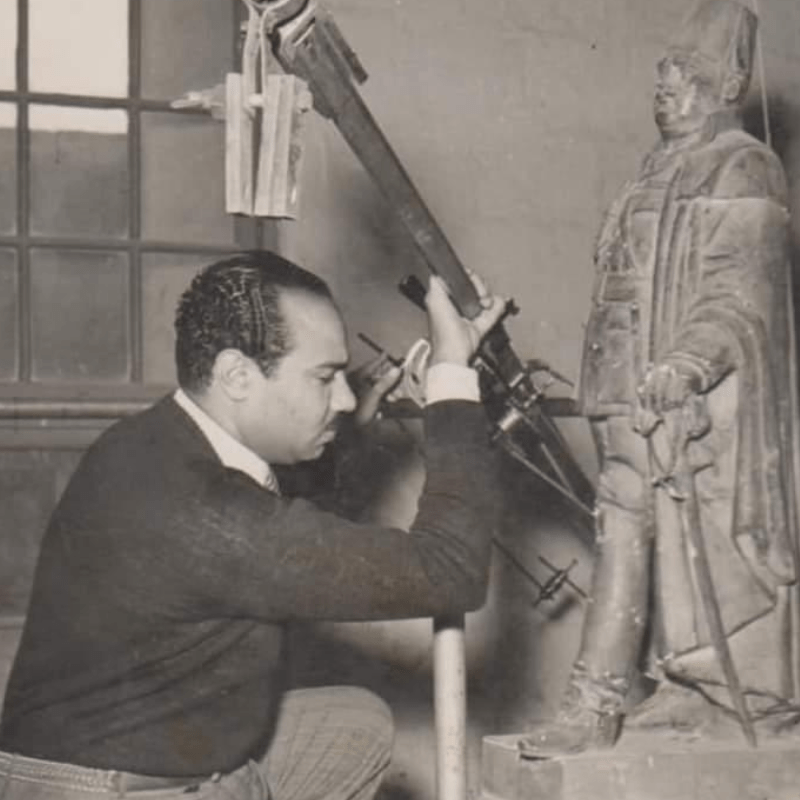
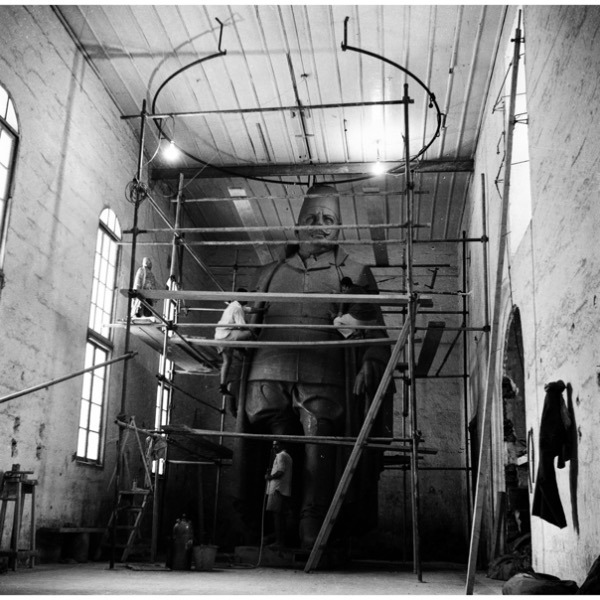
Dreams Without Limits: Mahmoud’s Expanding Horizons
In 1961, Mahmoud branched out again to produce home furnishings with the Modern Age Furniture Factory. Then he shifted into architecture and urban development with Eden Rock, a serviced residential complex in King Maryout on the peaceful outskirts of Alexandria. Not all of Mahmoud’s friends could keep up with his drive to excel in manufacturing and business.
“An artist lives with dreams… with imagination, with the ability to see what others cannot,” said one of Mahmoud’s companions. “My friend Fathy Mahmoud lived like a stranger twice. The artists used to tell him ‘you are a businessman,’ and his businessmen friends used to tell him ‘you are an artist.’ The problem with Fathy Mahmoud is that he was this and more. He was a sensitive soul who loved beauty in everything, but he was also a great businessman.”
Mahmoud’s ambitions were seemingly limitless. He dreamed of writing books about ceramics and sculpture. He had plans to help Egypt solve its housing shortage with new architectural designs and create simple furniture that would make Egyptian homes models of beauty.
He thought Cairo needed to plan for at least two centuries to come, tackle its traffic congestion and forge easy transport links with all of Egypt’s cities. Other proposals looked at boosting higher education and tourism, and encouraging small artistic industries like glassware, ceramics and carpentry.
“Art is one of the most important pillars of industry and its resurgence… because art depends on the human mind and the mind means logic, analysis and being foresighted and returning things to their origin,” Mahmoud said. “If I cannot express my ideas and implement them, then they are nothing but hallucinations.”

From Vision to Reality: The Egyptian German Porcelain Company
After the success of his Cairo stoneware factory, his next dream was for a porcelain facility in Alexandria that would make high-quality tableware. The project began in the late 1970s, with Mahmoud insisting on using the most advanced German technology and expertise. Tragically, he passed away in 1982 at the age of just 65. He left a loving family and a rich artistic legacy that endures to this day
“This artist needed to live a thousand years to fulfill all his dreams,” journalist Ismael Naquib wrote in a newspaper obituary. “We used to listen to him talk about his endless projects and we knew that his tired heart wouldn’t be able to withstand all these dreams. We hoped that his great dreams would help his heart cope. But suddenly his heart stopped and with it his great dreams.”
When Mahmoud passed away, the machinery had yet to be delivered to Egypt and the site remained barren land. But his three children vowed to fulfil what he had envisaged and pressed on with plans for his pioneering factory. Four years after his death, the first kiln was lit. The following year, production began.
The Egyptian German Porcelain Company, as the factory in Alexandria became known, initially produced just five tons of tableware per day. With decades of hard work and expansion, that figure grew to the almost 80 daily tons it turns out today as the largest such facility in the Middle East and Africa.
More than a century after his birth, the factory of Fathy Mahmoud’s dreams now produces tableware that’s a fixture in Egyptian homes and exported to more than 60 countries worldwide.
A fitting tribute to a master artist and businessman.

